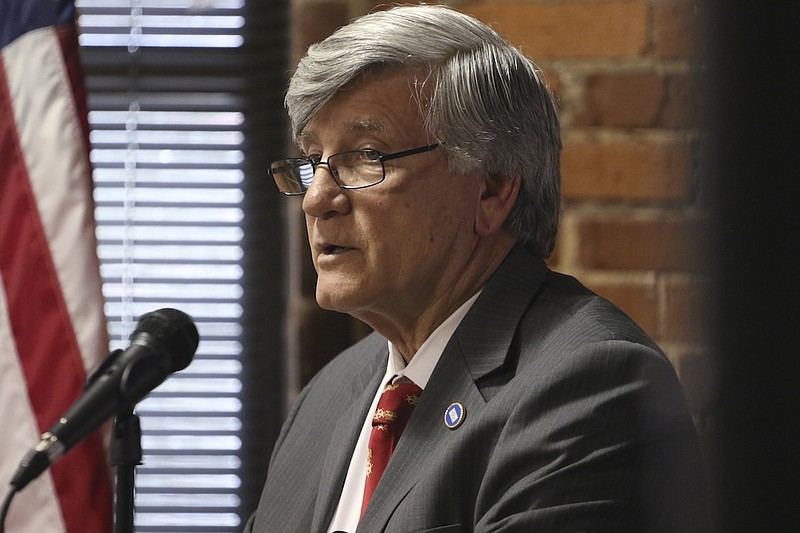NASHVILLE - State Sen. Todd Gardenhire is worried his effort to provide in-state college tuition rates to qualified Tennesseans who were brought to the U.S. illegally as children may get "Trumped" in the House this year.
Republican presidential hopeful Donald Trump's fiery rhetoric charging many undocumented Mexican immigrants are drug dealers and rapists and vows to erect a wall on the U.S.'s southern border have helped make him the front-runner in the GOP primary campaign.
"I have to say this," said Gardenhire, a conservative Chattanooga Republican who passed his "tuition equity" bill last year in the Senate only to see it fail by a single vote in the House. "I hope we don't get Trumped on this. There's a risk."
The lawmaker's comments came earlier this week as he and other legislators from Hamilton County met with Times Free Press reporters and editors before next Tuesday's start of the Tennessee General Assembly's annual session.
Given the massive news coverage Trump has received on his immigration rhetoric, Gardenhire said, "there's a risk that will all be in play for our opponents, fodder, if you will."
If that happens, it would be a shame, said Gardenhire, adding many of South and Latin America's brightest already are here in the U.S. as they seek to escape violence and find a better life for themselves and their children.
"Regardless of what Trump says, we're not going to ship them back. They're here," Gardenhire said, referring to other statements made by the millionaire mogul and one-time reality show star.
Gardenhire said the issue is giving would-be students, many of whom grew up in the U.S., an opportunity to afford to go to college. That's important, he said, because graduates make more money and lead more productive lives.
Instead of relying heavily on government services, the senator said, they would be taxpayers. In fact, Gardenhire said, most already are paying sales taxes to support higher education. Tennessee is a state where the prime source of government revenue is sales taxes on items ranging from baby food and clothes to cars.
While the "tuition equity" bill easily passed the Senate by a nearly two-thirds majority last year, it failed in the House last year on a 49-47 vote. It needed 50 votes to pass, but two supporters were absent. Since this is the second year of the 109th General Assembly, senators' vote on the measure still stands. And so does the fight in the House.
Eban Cathey, co-executive director of the Tennessee Immigrant and Refugee Rights Coalition, said he believes Gardenhire's concerns are misplaced.
"This bill passed the Senate last year, 2-1 basically. It's got overwhelming support," Cathey said. "I'm not sure why kids going to college is controversial. This bill is about education."
Rep. Marc Gravitt, R-East Ridge, told the Times Free Press during Tuesday's meeting the bill requires students jump through any number of "hoops" to qualify for in-state tuition.
They now have to pay out-of-state tuition that can be triple in-state rates and pose insurmountable barriers, affected students told the Times Free Press last year as they came to lobby for the bill.
Gravitt said the students must have lived in Tennessee, graduated from high school, have a good GPA and been deemed "lawfully present" in the U.S. under the through the federal Deferred Action for Childhood Arrivals program. He noted they don't get federal Pell grants or Tennessee Lottery-funded scholarships. It's the ability to pay in-state tuition rates, he said.
Deferred Action for Childhood Arrivals applies to people brought to the U.S. under age 16 who have been in the country at least five years, passed a criminal background check and applied for U.S. citizenship.
Gravitt said he would rather the students be in college than "have them out here on the streets, gang banging and selling drugs."
House Majority Leader Gerald McCormick, R-Chattanooga, agreed, noting the students can either be educated or "kept in ignorance" and become a drain on public resources.
McCormick said the bill was referred last spring to the House Calendar and Rules Committee after it failed. The panel, comprised of many legislative leaders, would have to vote on sending it back to the floor.
"I suspect that will not happen this year," McCormick said, later adding, "I think the political atmosphere is not in place where it's likely to pass this year."
Contact Andy Sher at asher@timesfreepress.com, 615-255-0550 or follow via twitter at @AndySher1.
